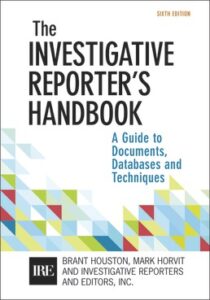A thoroughly rewritten and extensively updated sixth edition of “The Investigative Reporter’s Handbook” can be ordered online in time for the fall academic semester.

Two former IRE executive directors — IJEC’s Brant Houston and Mark Horvit — collaborated to produce the new and sixth edition of the book, which was updated last in 2009. Since its debut in 1983, the book has been viewed as the definitive guide for investigative journalists. It’s been used widely in journalism classrooms and newsrooms for decades as essential reading and reference.
Recognizing how quickly some online sources come and go, this edition will be supported by the IRE Resource Center, which regularly will maintain and update links to web sites and articles. The digital supplement of resources and links will be linked to each chapter, similar to how IJEC maintains the links for Houston’s Data for Journalists book.
“Every chapter has been updated and recast to reflect advances in the field, current trends and technology, and recent investigative work,” said Horvit, who served as IRE executive director from 2007-16. He now works as director of the State Government Reporting Program at the Missouri School of Journalism. “I and countless other journalists have relied on the Handbook as a definitive source for all things investigative, and we wanted to make sure this new edition carried on that tradition.”
Houston, who served as IRE executive director from 1997-2007 and has served since then as the Knight Chair of Investigative Reporting at the University of Illinois, added: “This edition will ensure that the Handbook continues to be a valuable and lasting encyclopedic guide for classrooms and newsrooms.”
The book, published by Macmillan Learning, features 23 detailed chapters on topics including a wide variety of specific beats, data, documents and writing the compelling investigation. Two new chapters focus on news collaborations and social justice investigations.
“I’m grateful to Mark and Brant for their expertise, dedication and countless hours of work on this project,” IRE Executive Director Doug Haddix said. “They’re provided an invaluable service to educators, students and working journalists.”